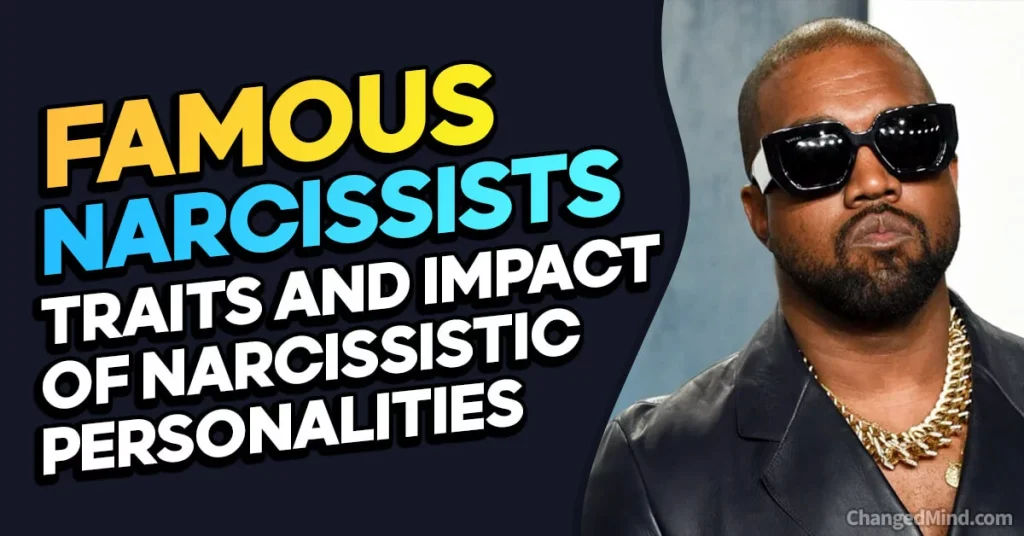Ever wondered if the glitz and glamour of fame comes with a touch of narcissism? Spoiler alert: it often does!
In this captivating article, we’re taking a deep dive into the intriguing world of famous people with narcissism.
From Hollywood stars to world leaders, we’ll explore the traits and impact of these larger-than-life personalities.
Get ready to uncover the truth behind the spotlight as we navigate the fascinating realm of narcissism.
Here’s a glimpse of what’s in store:
- The Allure of Narcissistic Personalities
- Celebrities and Their Narcissistic Traits
- Power, Influence, and Narcissism
- The Dark Side: Narcissism and Its Impact
- Case Studies: Famous Individuals and Their Narcissistic Behaviors
- The Fine Line: Confidence vs. Narcissism
Prepare for a wild ride as we dissect the fascinating world of famous people with narcissism. Let’s peel back the layers and explore the traits and impacts of these captivating personalities. Buckle up, it’s going to be an illuminating journey!
Understanding Narcissism
Brief Explanation of Narcissism and Its Defining Characteristics
Narcissism, my friend, is not just an excessive fascination with one’s reflection in the mirror. It’s a psychological trait that manifests as an inflated sense of self-importance, an insatiable need for admiration, and a lack of empathy towards others. These individuals are like magnets, drawing all attention and admiration toward themselves, often at the expense of those around them.
The defining characteristics of narcissism include:
- Grandiosity: A grandiose self-image, believing they are special and deserving of special treatment.
- Lack of Empathy: A limited ability to understand or care about the feelings and needs of others.
- Constant Need for Admiration: A relentless pursuit of attention, praise, and validation from others.
- Sense of Entitlement: An expectation of special treatment, privileges, and unwavering compliance with their desires.
Importance of Understanding Famous People with Narcissism
You might be wondering, “Why should I care about these famous narcissistic figures?” Well, my friend, understanding famous people with narcissism goes beyond mere curiosity. It provides us with valuable insights into the dynamics of toxic relationships, the impact of narcissistic behavior on society, and the challenges faced when dealing with such personalities.
By studying these well-known narcissists, we gain a deeper understanding of:
- The red flags and warning signs of narcissistic behavior in our own lives and relationships.
- The effects of narcissism on personal well-being, self-esteem, and mental health.
- The societal implications of placing these individuals on pedestals and perpetuating their self-absorption.
So buckle up and get ready to explore the world of famous people with narcissism. It’s a wild ride filled with shocking revelations, thought-provoking analysis, and valuable lessons for navigating the complex landscape of human behavior.
Understanding Narcissistic Personality Disorder (NPD)
Now that we’ve explored the allure of famous people with narcissism, it’s time to dive deeper into the realm of Narcissistic Personality Disorder (NPD). Understanding the core features, diagnostic criteria, and impact of NPD can provide us with valuable insights into the complexities of narcissistic behavior.
Expert Says
Emily Simonian, LMFT
Licensed Marriage and Family Therapist, Thriveworks

Definition and Diagnostic Criteria of NPD
Narcissistic Personality Disorder, my friend, is a mental health condition characterized by a pervasive pattern of grandiosity, a constant need for admiration, and a lack of empathy. To meet the diagnostic criteria for NPD, an individual must exhibit significant impairment in the following areas:
- Grandiose Sense of Self-Importance: An exaggerated belief in one’s own abilities and accomplishments, often accompanied by fantasies of unlimited success and power.
- Preoccupation with Fantasies of Success and Power: An intense preoccupation with fantasies of unlimited success, brilliance, beauty, or ideal love.
- Need for Excessive Admiration: A constant and excessive need for admiration, attention, and affirmation from others.
- Sense of Entitlement: An unwarranted sense of entitlement, expecting special favors, privileges, or compliance with their desires.
- Lack of Empathy: A lack of empathy and an inability or unwillingness to recognize or identify with the feelings and needs of others.
- Envious and Jealous Behavior: Enviousness of others or a belief that others are envious of them, often resulting in behaviors to undermine or belittle others’ achievements.
- Arrogant and Haughty Attitude: An arrogant and haughty attitude, displayed through a superior, condescending demeanor or behaviors.
Key Traits and Behaviors Associated with Narcissism
Narcissism encompasses a wide range of traits and behaviors, which can manifest differently in each individual. Some key characteristics associated with narcissism include:
- Charismatic Charm: Narcissistic individuals often possess a charm and charisma that captivate others, making them initially appear attractive and engaging.
- Manipulative Tendencies: They are skilled manipulators, using charm, flattery, and even deceit to get what they want and maintain control over others.
- Grandiose Self-Image: They have an inflated self-image, believing they are exceptional, superior, and deserving of special treatment.
- Lack of Empathy: One of the defining features of narcissism is a lack of empathy, making it challenging for them to understand or care about the feelings of others.
Impact of NPD on Personal Relationships and Society
Narcissistic Personality Disorder can have significant ramifications for both personal relationships and society as a whole. Here are a few ways in which NPD can impact individuals and communities:
- Toxic Relationships: Being in a relationship with a narcissistic individual can be emotionally draining and psychologically damaging due to their manipulation, lack of empathy, and constant need for admiration.
- Erosion of Trust and Collaboration: In professional settings, narcissistic individuals may prioritize personal gain over teamwork and collaboration, leading to a toxic work environment and hindered productivity.
- Societal Influence: The prevalence of narcissistic figures in the media and popular culture can shape societal values and contribute to the perpetuation of self-centeredness, materialism, and unrealistic standards.
Understanding the complexities of Narcissistic Personality Disorder allows us to navigate these relationships and societal influences with greater awareness and equip ourselves with strategies to mitigate their impact.
10 Famous People with Narcissism: Examples and Analysis
Now, let’s delve into the captivating world of famous individuals who possess those larger-than-life egos and exhibit narcissistic tendencies. Brace yourself for a star-studded lineup of celebrities who have become synonymous with self-obsession, as we explore their traits, notable behaviors, and the profound impact they have had on their respective industries.

Here are 10 celebrity figures with well-documented narcissistic tendencies:
- Kanye West: Known for his grandiose statements and self-promotion, Kanye West’s larger-than-life persona and relentless pursuit of attention showcase narcissistic tendencies.
- Kim Kardashian: From her rise to fame through reality TV to her meticulous self-promotion, Kim Kardashian has built an empire around her own image and epitomizes narcissistic behavior.
- Donald Trump: The 45th President of the United States, Donald Trump’s bombastic rhetoric, relentless self-promotion, and disregard for others’ opinions are indicative of narcissistic traits.
- Madonna: A pop icon known for her boundary-pushing performances and self-reinvention, Madonna’s constant need for attention and validation aligns with narcissistic tendencies.
- Justin Bieber: With a history of erratic behavior and a sense of entitlement, Justin Bieber has displayed narcissistic traits throughout his rise to stardom.
- Lindsay Lohan: Lindsay Lohan’s tumultuous personal life, attention-seeking behavior, and frequent conflicts with the law have often been associated with narcissistic tendencies.
- Naomi Campbell: Known for her diva-like behavior and demands, Naomi Campbell’s high self-regard and expectation of special treatment reflect narcissistic traits.
- Charlie Sheen: Charlie Sheen’s public meltdown, fueled by grandiose claims and a sense of superiority, brought attention to his narcissistic behavior.
- Mariah Carey: Mariah Carey’s diva reputation and excessive self-importance, coupled with her need for constant admiration, align with narcissistic tendencies.
- Gordon Ramsay: Renowned chef and television personality, Gordon Ramsay’s explosive temperament, need for control, and self-centeredness have contributed to his reputation for narcissistic behavior.
Remember, this list is based on public perceptions and media portrayals of these celebrities. It’s important to note that diagnosing narcissism requires professional evaluation and should not be done based solely on public behavior and reports.
Gordon Ramsay: From the Kitchen to Narcissistic Behavior

Ah, Gordon Ramsay, the fiery chef known for his culinary expertise and captivating television presence. While he has undoubtedly revolutionized the culinary world, his larger-than-life personality and assertive demeanor have raised questions about narcissistic tendencies. Let’s dive into the world of Gordon Ramsay and explore the traits that have contributed to his reputation.
Expert Says
Silvi Saxena, MBA, MSW, LSW, CCTP, OSW-C
Licensed Social Worker | Certified Clinical Trauma Professional, Choosing Therapy

Brief Profile
Gordon James Ramsay, born on November 8, 1966, is a British chef, restaurateur, and television personality. With multiple Michelin-starred restaurants, cookbooks, and popular shows like “Hell’s Kitchen” and “MasterChef,” Ramsay has become a household name in the culinary industry.
Explosive Temperament and Need for Control
Ramsay’s behavior in the kitchen and on-screen has often displayed characteristics associated with narcissistic behavior:
- Explosive Temperament: Ramsay is notorious for his outbursts of anger, harsh criticism, and colorful language. While it can be entertaining to watch, his explosive temperament reflects a desire for control and dominance.
- Perfectionism and Control: Ramsay’s relentless pursuit of perfection and his need for control in the kitchen highlight his narcissistic tendencies. He expects nothing short of excellence and demands complete authority over his culinary domain.
Behind the Scenes
While Ramsay’s television persona emphasizes his assertiveness and brash nature, it’s important to remember that reality TV often amplifies certain traits for entertainment purposes. Off-camera, Ramsay has shown a more compassionate side, mentoring aspiring chefs and engaging in philanthropic endeavors.
Lessons from the Kitchen
Gordon Ramsay’s success as a chef and television personality cannot be denied. However, it’s essential to recognize that the traits associated with narcissism can have both positive and negative consequences:
- Drive for Excellence: Ramsay’s commitment to culinary excellence has pushed boundaries and inspired countless aspiring chefs.
- Balancing Assertiveness: It’s crucial to strike a balance between assertiveness and empathy in professional settings. While a strong drive for success is valuable, it should not come at the expense of others’ well-being.
Final Thoughts
Gordon Ramsay’s culinary prowess and charismatic personality have made him a household name. While his explosive temperament and need for control may align with narcissistic behavior, it’s important to approach the topic with nuance. Ramsay’s impact on the culinary industry and his ability to entertain viewers worldwide cannot be understated.
Expert Says
Licensed Marriage and Family Therapist | Founder, The Relationship Place

As fans and aspiring chefs, let us appreciate the lessons learned from Ramsay’s journey, maintaining a discerning eye and recognizing the line between passion and narcissism. With the right balance of assertiveness and empathy, we can all strive for culinary greatness while fostering a supportive and collaborative environment in the kitchen.
Justin Bieber: Navigating Stardom and Narcissistic Traits

Ah, Justin Bieber, the pop sensation who captured hearts and headlines with his meteoric rise to stardom. But behind the catchy tunes and adoring fans, there have been instances of behavior that align with narcissistic traits. Let’s take a closer look at his journey and the signs of narcissism that have emerged along the way.
Brief Profile
Justin Drew Bieber, born on March 1, 1994, is a Canadian singer, songwriter, and multi-instrumentalist. Discovered through YouTube, Bieber skyrocketed to fame at a young age, quickly amassing a dedicated fan base known as “Beliebers.”
Erratic Behavior and Entitlement
Throughout his career, Bieber has showcased certain behaviors indicative of narcissistic tendencies:
- Erratic Behavior: Bieber has faced several run-ins with the law, including instances of reckless driving, altercations with paparazzi, and legal troubles. These episodes of impulsive behavior reflect a sense of entitlement and disregard for societal rules.
- Sense of Entitlement: Bieber’s entitled behavior has been evident in various instances, such as disrespectful interactions with fans, demanding behavior towards staff, and a perceived lack of accountability for his actions.
The Influence of Fame
It’s crucial to recognize the impact that fame and immense success can have on an individual’s behavior. Being thrust into the spotlight at a young age, with legions of fans and constant media attention, can distort one’s sense of reality and contribute to the development of narcissistic traits.
Lessons Learned and Personal Growth
While Bieber’s behavior has raised eyebrows and sparked controversy, it’s essential to remember that people can evolve and change. Recognizing and acknowledging one’s own flaws is a crucial step towards personal growth. In recent years, Bieber has publicly addressed his past mistakes, emphasizing the importance of self-reflection and taking responsibility for one’s actions.
Final Thoughts
Justin Bieber’s journey from YouTube sensation to global superstar has been a whirlwind. While his achievements in the music industry are undeniable, it’s important to evaluate the behaviors and attitudes exhibited along the way. Understanding the interplay between fame, youth, and the development of narcissistic traits allows us to reflect on the complexities of celebrity culture and the potential impact it can have on individuals.
Expert Says
Dr. Fumi Stephanie Hancock, PSYCHDNP
Founder, POB Psychiatry

As fans and observers, it is crucial to approach these discussions with empathy and a balanced perspective. Let us encourage open dialogue about the consequences of fame, the importance of personal growth, and the awareness of narcissistic tendencies to foster a healthier and more compassionate environment within the realm of celebrity culture.
Kanye West: A Case of Relentless Self-Promotion
Let’s shine the spotlight on Kanye West, a prominent figure whose grandiose statements and larger-than-life persona have often been associated with narcissistic tendencies. Known for his music, fashion endeavors, and controversial public appearances, Kanye West’s relentless pursuit of attention has made him a captivating subject for analysis.
Brief Profile
Kanye West, born on June 8, 1977, is an American rapper, producer, and fashion designer. With a career spanning decades, he has achieved significant success in the music industry, winning numerous awards and gaining a dedicated fan base. However, it is his behavior and public persona that have drawn attention to his narcissistic tendencies.
Traits and Behaviors
Kanye West’s narcissistic traits are evident in several aspects of his public life:
- Grandiose Statements: Kanye West is known for making extravagant claims about his talents and accomplishments. From declaring himself the “greatest artist of all time” to comparing his creative genius to that of historical figures, his statements reflect a grandiose self-image.
- Self-Promotion: Relentless self-promotion is a hallmark of Kanye West’s persona. He actively seeks attention, often using provocative methods to generate buzz around his projects and public appearances.
- Attention-Seeking Behavior: Kanye West has a knack for capturing the media’s attention through controversial moments and public outbursts. These attention-seeking behaviors serve to keep him in the spotlight, regardless of the public’s reaction.
Notable Examples
To better understand Kanye West’s narcissistic tendencies, let’s examine some notable examples:
- Taylor Swift Incident: At the 2009 MTV Video Music Awards, Kanye West infamously interrupted Taylor Swift’s acceptance speech, proclaiming that Beyoncé deserved the award instead. This impulsive act demonstrated a lack of consideration for others and a desire to be the center of attention.
- Twitter Rants: Kanye West has a history of using Twitter as a platform for self-promotion and airing his opinions, often in a stream-of-consciousness style. These rants showcase his grandiose beliefs and a sense of entitlement to express his thoughts without filter.
Expert Says
Dr. Jordan Schaul
Scientist with Degrees in Biology and Psychology | Founder, Scapegoat Strength

Analysis
Kanye West’s behavior aligns with narcissistic tendencies commonly associated with Narcissistic Personality Disorder (NPD). While we cannot diagnose him based solely on public perception, his actions consistently exhibit traits such as grandiosity, self-promotion, and a need for constant attention and validation.
Final Thoughts
Kanye West’s larger-than-life persona and relentless pursuit of attention have made him an intriguing figure in the realm of famous people with narcissism. By analyzing his behavior, we gain insights into the complex nature of narcissistic tendencies and their impact on public figures.
Kim Kardashian: The Queen of Self-Promotion
Ah, the glamorous world of Kim Kardashian! This influential figure has captivated millions with her rise to fame through reality TV and her meticulous self-promotion. Let’s dive into the realm of Kim Kardashian and explore how she has built an empire around her own image, making her a prime example of narcissistic behavior.
Brief Profile
Kim Kardashian, born on October 21, 1980, is an American media personality, entrepreneur, and social media influencer. She gained initial recognition through the reality TV show “Keeping Up with the Kardashians,” which chronicled the lives of her and her family. Since then, Kim Kardashian has transformed her fame into a multi-million-dollar empire.
Traits and Behaviors
Kim Kardashian’s public persona and business ventures exemplify several narcissistic traits:
- Self-Promotion: Kim Kardashian has mastered the art of self-promotion. From strategic social media posts to meticulously crafted public appearances, she consistently keeps herself in the spotlight.
- Image-Oriented: Maintaining a carefully curated image is paramount to Kim Kardashian. She often emphasizes physical appearance, fashion, and lifestyle, showcasing a self-absorbed focus on external validation and admiration.
- Attention-Seeking: Kim Kardashian seeks attention through provocative photo shoots, scandalous outfits, and controversial moments. These calculated moves generate buzz, ensuring she remains at the center of public discourse.
Expert Says
Ike Kalson
Co-founder, Live Narcissist Free

Notable Examples
Let’s take a look at some notable examples that highlight Kim Kardashian’s narcissistic tendencies:
- Social Media Presence: Kim Kardashian’s extensive social media following allows her to control her narrative and continuously promote herself. She strategically shares snippets of her personal life, fashion choices, and business endeavors, ensuring her online presence remains prominent.
- Brand Expansion: From beauty products to shapewear, Kim Kardashian has successfully built a brand empire. Her self-focused business ventures capitalize on her image and popularity, reinforcing her narcissistic tendencies.
Analysis
Kim Kardashian’s behavior aligns with the traits commonly associated with narcissistic tendencies. While we cannot diagnose her with Narcissistic Personality Disorder (NPD) solely based on public perception, her consistent emphasis on self-promotion, image, and attention aligns with narcissistic behavior patterns.
Final Thoughts
Kim Kardashian’s journey from reality TV star to media mogul showcases the power of self-promotion and the allure of narcissistic behavior. As we examine her example, it’s essential to remember that understanding narcissism in public figures should not be used as a basis for judgment or criticism. Instead, let’s use these examples to foster awareness and engage in conversations about self-image, personal branding, and the impact of social media.
Whether you admire her or find her self-focused approach perplexing, Kim Kardashian’s influence on popular culture is undeniable. So, take a moment to ponder how her empire-building and relentless self-promotion relate to the broader topic of narcissism and its impact on our society.
Donald Trump: The Controversial Figure with Narcissistic Traits

Let’s talk about Donald Trump, the 45th President of the United States, whose bombastic rhetoric, relentless self-promotion, and disregard for others’ opinions have often raised discussions about his narcissistic traits.
Brief Profile
Donald Trump, born on June 14, 1946, is a businessman and politician who served as the President of the United States from 2017 to 2021. His unique approach to politics and larger-than-life personality have made him a polarizing figure.
Traits and Behaviors
Donald Trump’s public persona and behavior align with several narcissistic traits:
- Bombastic Rhetoric: Known for his provocative and grandiose statements, Trump’s bombastic rhetoric seeks attention and portrays an inflated self-image.
- Relentless Self-Promotion: Trump has mastered the art of self-promotion, whether through his business ventures, TV shows, or political campaigns. He consistently seeks the spotlight to bolster his image and maintain public interest.
- Disregard for Others’ Opinions: Trump has shown a tendency to dismiss or downplay opposing viewpoints, often exhibiting a lack of empathy and an inclination to prioritize his own beliefs and interests.
Expert Says
Professional Problem Solver and Relationship Expert | Author, “Toxic Person Proof: Clear the Confusion and Learn to Trust Yourself“

Notable Examples
Let’s explore some notable examples that highlight Donald Trump’s narcissistic tendencies:
- Twitter Presence: Trump’s active and controversial presence on Twitter became a defining aspect of his presidency. He used the platform to express his opinions, engage with supporters, and attack critics, showcasing his self-centered communication style.
- Campaign Style: During his political campaigns, Trump often drew attention to himself through dramatic entrances, boasting about his accomplishments, and making grandiose promises, positioning himself as an exceptional candidate.
Analysis
While it’s important to note that we cannot diagnose Donald Trump with Narcissistic Personality Disorder (NPD) based solely on public perception, his behavior consistently exhibits traits commonly associated with narcissism. This has sparked widespread discussions and analysis from various perspectives.
Final Thoughts
Donald Trump’s presidency and public persona provide valuable insights into the realm of famous people with narcissistic tendencies. As we examine his example, it’s crucial to approach the topic with empathy and understanding, recognizing the complex interplay between personality traits, public perception, and political dynamics.
Whether you perceive Donald Trump as a controversial figure or admire his unapologetic approach, his influence and impact on politics cannot be denied. So, take a moment to reflect on how his bombastic rhetoric, relentless self-promotion, and disregard for others’ opinions relate to the broader discussion on narcissism and its influence in society.
Naomi Campbell: From the Runway to Diva-like Behavior
Ah, Naomi Campbell, the iconic supermodel whose fierce strut and captivating presence have left an indelible mark on the fashion industry. While she’s hailed as one of the greatest models of all time, her diva-like behavior and demanding nature have often raised eyebrows and sparked discussions about narcissistic tendencies. Let’s take a closer look at Naomi Campbell and the traits that have contributed to her reputation.
Brief Profile
Naomi Elaine Campbell, born on May 22, 1970, is a British supermodel, actress, and businesswoman. Her striking features, poise, and influential presence have solidified her status as a fashion icon. With a career spanning several decades, Campbell has graced countless magazine covers, walked prestigious runways, and collaborated with renowned designers.
Diva-like Behavior and High Self-regard
Naomi Campbell’s behavior both on and off the runway has often been associated with narcissistic traits:
- Diva-like Demands: Campbell has a reputation for making extravagant demands and expecting special treatment. From specific room temperatures to specific brands of water, her diva-like behavior showcases a sense of entitlement and self-importance.
- Elevated Self-regard: Campbell’s confidence and belief in her own exceptionalism are evident in her interviews and interactions. She exudes an air of superiority and expects others to recognize and cater to her status.
The Reality of Stardom
While it’s easy to focus solely on the negative aspects, it’s important to remember that the intense world of modeling and celebrity status can contribute to certain behaviors:
- Media Pressure: Constant media scrutiny and public expectations can lead to a heightened sense of self-importance and demands for special treatment.
- Coping Mechanisms: Some individuals in the spotlight develop defense mechanisms to navigate the pressures of fame. These mechanisms can manifest as narcissistic behaviors but may not fully represent their true personalities.
Lessons Learned
Naomi Campbell’s impact on the fashion industry is undeniable, and her journey offers valuable insights:
- Self-Confidence: Campbell’s unwavering self-confidence and belief in her abilities serve as a powerful reminder to embrace and celebrate our unique qualities.
- Awareness and Balance: Recognize the fine line between confidence and narcissism. While self-assurance is essential, it’s crucial to avoid belittling others or expecting special treatment.
Final Thoughts
Naomi Campbell’s career has left an indelible mark on the fashion industry, and her diva-like behavior has become part of her persona. While her demanding nature and high self-regard may align with narcissistic tendencies, it’s important to approach the topic with nuance. Campbell’s contributions to fashion, advocacy for diversity, and philanthropic endeavors should not be overlooked.
As admirers of her talent and presence, let us appreciate the lessons we can learn from Campbell’s journey. By balancing confidence with empathy and treating others with respect, we can foster a positive and inclusive environment within the fashion industry and beyond.
Madonna: Pushing Boundaries with a Narcissistic Edge
Let’s delve into the world of Madonna, the pop icon known for her boundary-pushing performances and self-reinvention. Madonna’s constant need for attention and validation has often led to discussions about her narcissistic tendencies.
Brief Profile
Madonna Louise Ciccone, born on August 16, 1958, is an American singer, songwriter, actress, and businesswoman. With a career spanning decades, Madonna has left an indelible mark on popular culture, known for her provocative image and innovative approach to music.
Expert Says
Sara Sloan, LMFT-Associate, MA Counseling
Marriage and Family Therapist, Austin Concierge Therapy

Traits and Behaviors
Madonna’s public persona and artistic choices align with several narcissistic traits:
- Constant Need for Attention: Madonna thrives on attention and seeks to remain in the spotlight through various means, including controversial music videos, provocative fashion choices, and headline-grabbing performances.
- Validation-Seeking: Madonna’s relentless pursuit of validation is evident in her relentless drive for success and constant reinvention. She constantly seeks approval and admiration from both the industry and her fans.
- Self-Reinvention: Madonna’s ability to reinvent herself throughout her career showcases her desire for constant change and the need to be at the forefront of cultural trends. This reflects her need for recognition and a continuous quest for self-assertion.
Notable Examples
Let’s explore some notable examples that highlight Madonna’s narcissistic tendencies:
- Provocative Performances: Madonna has consistently pushed boundaries through her provocative performances, including her infamous “Like a Virgin” MTV Video Music Awards performance in 1984. These displays of self-expression and calculated attention-grabbing contribute to her narcissistic image.
- Fashion and Image: Madonna’s ever-evolving fashion choices and deliberate image transformations have been central to her career. From her iconic cone bra to her role as a trendsetter, she strategically uses fashion as a tool for self-promotion and validation.
Analysis
While we cannot diagnose Madonna with Narcissistic Personality Disorder (NPD) based solely on public perception, her behavior and artistic choices align with narcissistic tendencies commonly associated with performers and artists. It’s essential to remember that her persona is intricately tied to her public image and the entertainment industry.
Final Thoughts
Madonna’s impact on popular culture and her narcissistic tendencies provide valuable insights into the realm of famous people with narcissism. As we explore her example, it’s crucial to approach the topic with a nuanced perspective, recognizing the complex interplay between artistic expression, self-promotion, and the need for validation.
Whether you view Madonna as an empowered artist pushing boundaries or as a self-centered attention-seeker, her influence in the music industry is undeniable. So, take a moment to reflect on how her constant need for attention and validation relates to the broader discussion on narcissism and the fine line between self-expression and self-absorption.
Lindsay Lohan: The Rollercoaster of Fame and Narcissistic Tendencies
Ah, Lindsay Lohan, the once promising young actress who skyrocketed to fame and found herself at the center of tabloid headlines. Her journey has been a rollercoaster ride, marked by personal struggles, attention-seeking behavior, and brushes with the law. Let’s delve into Lindsay Lohan’s tumultuous life and explore the narcissistic tendencies that have often come to the forefront.
A Brief Profile
Born on July 2, 1986, in New York City, Lindsay Lohan entered the entertainment industry at a young age. She gained prominence with roles in films like “Mean Girls” and “Freaky Friday,” earning critical acclaim for her talent and charisma.
Tumultuous Personal Life
Lindsay Lohan’s personal life has been filled with ups and downs, and her behavior has raised questions about narcissistic tendencies:
- Attention-seeking Behavior: Lindsay Lohan has frequently sought attention through provocative actions and public displays. From erratic social media posts to public feuds, she has demonstrated a desire for constant validation and the spotlight.
- Reckless Lifestyle: Lohan’s struggles with substance abuse and multiple encounters with the law have contributed to her reputation for impulsivity and disregard for consequences.
Fame, Pressure, and Self-image
It’s important to consider the role of fame and the pressures it can exert on an individual:
- Intense Public Scrutiny: Lindsay Lohan’s rise to stardom at a young age subjected her to intense public scrutiny. The constant pressure to maintain an image of success and desirability can amplify narcissistic tendencies.
- Identity Formation: The process of developing a solid sense of self can be challenging under the glare of the public eye. Lohan’s turbulent personal life may reflect the difficulties she faced in forming a stable self-identity.
Lessons Learned
Lindsay Lohan’s journey serves as a cautionary tale and offers valuable lessons:
- Empathy and Support: Instead of fueling judgment and criticism, it’s essential to approach individuals like Lohan with empathy and offer support during challenging times.
- Self-reflection and Growth: Lohan’s experiences highlight the importance of self-reflection and personal growth. Recognizing one’s own shortcomings and seeking help can lead to positive transformation.
Final Thoughts
Lindsay Lohan’s life has been a whirlwind of fame, controversy, and personal struggles. While her behavior may align with narcissistic tendencies, it’s crucial to approach the topic with empathy and understanding. As observers, we can learn from her journey, reminding ourselves of the importance of self-reflection, growth, and supporting others through their challenges.
Let us not forget that behind the headlines and sensational stories, there is a human being navigating the complexities of life. By embracing compassion and offering a helping hand, we can contribute to a more compassionate and supportive society.
Analysis of the Influence of Narcissistic Individuals on Their Industries

- Impact on the Entertainment Industry: Narcissistic individuals in the entertainment industry often dominate headlines, captivating audiences with their outrageous behavior and insatiable thirst for attention. While their narcissism can contribute to their rise to stardom, it also poses challenges for personal relationships and long-term success.
- Influence on Celebrity Culture: The cult of personality surrounding narcissistic celebrities fuels a fascination that drives media attention, fan followings, and even trends.
- Reinforcement of Unrealistic Standards: The emphasis on self-image and materialism perpetuated by narcissistic figures can have a negative impact on societal expectations and self-esteem.
- Effect on Creative Collaborations: Narcissistic tendencies can strain relationships within the entertainment industry, hindering cooperation and fostering an environment of competition.
- Impact on Politics and Leadership: Narcissism often finds its way into the realm of politics and leadership, where charismatic and self-assured individuals can captivate the masses. However, the influence of narcissistic leaders can have far-reaching consequences.
- Charismatic Appeal: Narcissistic leaders can command attention and inspire followers through their charisma and grandiose promises.
- Risk of Authoritarianism: A narcissistic leader’s need for control and admiration can lead to a disregard for democratic principles and an erosion of trust in institutions.
- Ethical Concerns: Narcissism can foster a lack of empathy and a focus on personal gain, potentially compromising ethical decision-making.
- Impact on Business and Entrepreneurship: In the world of business and entrepreneurship, narcissistic traits can both drive success and present significant challenges.
- Ambition and Risk-Taking: Narcissistic entrepreneurs often possess an unwavering self-belief that propels them to take risks and pursue ambitious goals.
- Disruptive Innovation: The confidence and self-assuredness of narcissistic leaders can drive them to challenge the status quo, leading to groundbreaking innovation.
- Potential for Toxic Work Environments: Narcissistic leaders may create toxic work environments characterized by a lack of empathy, manipulation, and favoritism.
Stay tuned as we explore the fascinating allure and dangers associated with the world of narcissistic personalities in the upcoming sections.
10 Historical Figures With Narcissism
Here are 10 historical figures who have been suggested to exhibit narcissistic traits:
- Emperor Nero – Infamous Roman Emperor known for his self-absorption and extravagant lifestyle.
- King Louis XIV – The “Sun King” of France, who ruled with absolute power and indulged in opulence and self-glorification.
- Empress Catherine the Great – Long-reigning Russian monarch known for her desire for power, admiration, and extravagant living.
- Henry VIII – English monarch famous for his multiple marriages, volatile temper, and self-centered actions.
- Napoleon Bonaparte – French military leader and emperor known for his grandiose ambitions, thirst for power, and self-promotion.
- Adolf Hitler – German dictator whose extreme narcissism and delusions of grandeur led to catastrophic consequences during World War II.
- Benito Mussolini – Italian fascist leader who displayed narcissistic behavior through his authoritarian rule and obsession with personal image.
- Idi Amin – Ugandan dictator known for his brutality, self-aggrandizement, and eccentric personality.
- Joseph Stalin – Soviet leader whose narcissistic traits were evident in his ruthless pursuit of power, disregard for human life, and cult of personality.
- Saddam Hussein – Iraqi dictator characterized by his narcissistic tendencies, oppressive rule, and obsession with maintaining power and control.
Please note that this list is not exhaustive, and the inclusion of individuals in this list is based on historical assessments and discussions surrounding their behavior and characteristics.
The Fascination and Attraction of Narcissistic Personalities
Ah, the allure of narcissistic personalities! It’s undeniable that society has a peculiar fascination with these larger-than-life figures. From the entertainment industry to politics, they seem to captivate our attention and ignite our curiosity. So, what exactly makes us so intrigued by these self-absorbed individuals? Let’s explore the reasons behind our captivation.
Reasons Why Society is Captivated by Famous People with Narcissism
- Charisma and Confidence: Narcissistic individuals often possess an irresistible charm and unwavering confidence. Their self-assuredness can be infectious, drawing us in and making us curious about their secret to success.
- Unconventional Personalities: The eccentricities and flamboyant behavior of narcissistic figures can be fascinating. Their larger-than-life personas and unpredictable actions make them stand out from the crowd, leaving us both bewildered and intrigued.
- Aspirational Appeal: In a world where success is often idolized, narcissistic figures embody a certain level of achievement and grandiosity that some may find alluring. Their lavish lifestyles, fame, and self-promotion can ignite a desire for similar recognition and adulation.
The Role of Media in Perpetuating the Image of Narcissistic Individuals
The media plays a significant role in perpetuating the image of narcissistic individuals, amplifying their presence and fueling our fascination. Here’s how the media contributes to the allure of these personalities:
- Celebrity Culture: Our obsession with celebrity culture fuels the demand for stories about the lives and antics of famous individuals. The media caters to this demand by providing extensive coverage of narcissistic figures, keeping us hooked on their every move.
- Selective Storytelling: Media outlets often focus on the sensational and controversial aspects of narcissistic individuals’ lives. Their outrageous behavior, scandals, and conflicts make for captivating headlines, leading to increased attention and engagement.
- Social Media Amplification: The rise of social media has given narcissistic figures a platform to showcase their grandiosity directly to the masses. They can carefully curate their online presence, garnering followers and perpetuating their image of self-importance.
The Danger of Idolizing Narcissistic Figures
While the allure of narcissistic personalities can be tempting, it’s crucial to recognize the dangers of idolizing them. Here are a few reasons why we need to approach our fascination with caution:
- Emotional Manipulation: Narcissistic individuals are adept at manipulating others to serve their own interests. They may exploit their admirers, using charm and flattery to gain influence and control.
- Unrealistic Standards: Idolizing narcissistic figures can lead to unrealistic standards of success, beauty, and wealth. It can create a distorted perception of reality, potentially impacting our self-esteem and overall well-being.
- Disregard for Others: Narcissistic personalities often lack empathy and prioritize their own needs above others. By idolizing them, we risk normalizing self-centered behavior and disregarding the importance of empathy and compassion in our relationships.
Remember, my friend, it’s important to appreciate the achievements and talents of famous individuals without losing sight of their flaws and the potential harm their narcissism can cause. By maintaining a balanced perspective, we can navigate our fascination with narcissistic personalities responsibly.
Psychological Insights and Lessons Learned
Now that we’ve explored the captivating world of famous people with narcissism, it’s time to delve into the psychological insights and valuable lessons we can glean from their behavior. By understanding the underlying motivations of narcissistic personalities and equipping ourselves with strategies to recognize and deal with narcissistic behavior, we can navigate our personal relationships more effectively and learn from the mistakes of those in the spotlight.
Understanding the Underlying Motivations and Insecurities of Narcissistic Personalities
Narcissistic individuals may project an air of confidence and superiority, but beneath the surface lies a complex web of motivations and insecurities that drive their behavior. Some key insights into their psyche include:
- Fragile Self-Esteem: Despite their grandiose exterior, narcissistic individuals often harbor deep-seated feelings of inadequacy and insecurity. Their self-worth is contingent on external validation and admiration.
- Fear of Rejection: Narcissists have an intense fear of rejection and abandonment, which drives their constant need for attention and validation. They may resort to manipulative tactics to ensure their social status remains intact.
- Defense Mechanisms: To protect their fragile self-esteem, narcissists employ defense mechanisms such as denial, projection, and blame-shifting. They may be highly sensitive to criticism and respond with aggression or defensiveness.
Strategies for Recognizing and Dealing with Narcissistic Behavior in Personal Relationships
Dealing with narcissistic behavior in personal relationships can be challenging, but armed with the right strategies, you can navigate these dynamics more effectively. Here are some tips to help you recognize and address narcissistic behavior:
- Set Boundaries: Establish clear boundaries and communicate your needs assertively. Narcissists often push boundaries, so it’s essential to be firm and consistent in enforcing them.
- Maintain Perspective: Remind yourself that the behavior of narcissistic individuals is a reflection of their own insecurities and not a reflection of your worth. Don’t internalize their criticisms or seek validation solely from them.
- Practice Self-Care: Prioritize your well-being and engage in activities that nurture your self-esteem. Surround yourself with a supportive network of friends and family who can provide a reality check and emotional support.
Learning from the Mistakes of Famous People with Narcissism
While it’s important to recognize and learn from the mistakes of famous narcissistic figures, it’s equally crucial to avoid perpetuating the cycle. Here are some lessons we can glean:
- Avoid Idolizing Toxic Behavior: Be mindful of the dangers of idolizing narcissistic figures. Separate their achievements from their narcissistic tendencies and focus on positive role models who exhibit empathy, humility, and kindness.
- Promote Healthy Relationships: Strive to cultivate healthy, balanced relationships based on mutual respect, empathy, and reciprocity. Seek out individuals who genuinely care about your well-being and support your personal growth.
- Cultivate Self-Awareness: Take the time to reflect on your own behaviors and motivations. Develop self-awareness to recognize any tendencies toward narcissistic behavior and work on fostering empathy and humility.
Remember, my friend, navigating relationships with narcissistic individuals can be challenging, but with a solid understanding of their motivations and the right strategies in place, you can protect your well-being and build healthier connections.
Conclusion
Congratulations, my friend, on reaching the end of our exploration into the fascinating world of famous people with narcissism. Let’s take a moment to recap the key points we’ve covered and reflect on the importance of raising awareness about narcissism and seeking support when dealing with narcissistic relationships.
Recap of Key Points Discussed
Throughout this journey, we’ve uncovered various aspects of narcissism and its impact on individuals and society. Here’s a quick recap of what we’ve learned:
- We defined narcissism and explored its defining characteristics, including grandiosity, lack of empathy, and a constant need for admiration.
- We delved into Narcissistic Personality Disorder (NPD), understanding its diagnostic criteria and key traits associated with narcissistic behavior.
- We analyzed the influence of narcissistic individuals on different industries, including entertainment, politics, and business.
- We explored the fascination society has with narcissistic personalities and the role of media in perpetuating their image.
- We discussed the dangers of idolizing narcissistic figures and the importance of maintaining a balanced perspective.
Importance of Raising Awareness about Narcissism and Its Impact
Raising awareness about narcissism is crucial, my friend. By understanding the traits and behaviors associated with narcissism, we can identify red flags, protect ourselves from toxic relationships, and promote healthier dynamics. It empowers us to recognize narcissistic behavior not only in famous individuals but also in our own lives and personal connections.
Moreover, awareness fosters empathy and compassion, enabling us to support those who may be impacted by narcissistic individuals. By creating a culture that values kindness, understanding, and authentic connections, we can counteract the negative influence of narcissism on society.
Seek Professional Help and Support for Dealing with Narcissistic Relationships
Dealing with narcissistic relationships can be incredibly challenging and emotionally draining. If you find yourself in such a situation, remember that you don’t have to face it alone. Seeking professional help from therapists, counselors, or support groups can provide invaluable guidance and support tailored to your specific circumstances.
Additionally, lean on your trusted friends and family for emotional support. Surround yourself with individuals who truly care about your well-being and can provide a safe space for you to express your feelings and concerns.
Remember, my friend, your mental health and well-being should always be a priority. You deserve to be in relationships that are built on mutual respect, empathy, and genuine care. Don’t hesitate to reach out for the support you need.
As we conclude this journey into the realm of famous people with narcissism, let us carry forward the insights we’ve gained. By applying this knowledge, fostering healthy connections, and promoting empathy, we can create a world that values authentic relationships and embraces the beauty of genuine human connection.
FAQs about Famous People With Narcissism
Are all famous people narcissistic?
No, not all famous people are narcissistic. While some exhibit narcissistic traits, it’s important to recognize that fame does not automatically indicate narcissism. People in the public eye can display a range of personality characteristics.
Can narcissism be treated or cured?
Narcissistic Personality Disorder (NPD) is challenging to treat because individuals with NPD often lack insight into their condition. However, therapy, such as cognitive-behavioral approaches, can help manage symptoms and develop healthier coping mechanisms.
Do all narcissists exhibit the same behaviors?
Narcissistic individuals can display a variety of behaviors, but there are common traits such as self-importance, lack of empathy, and a constant need for admiration. However, the degree and manifestation of these behaviors may vary among individuals.
Can someone with narcissism change or grow out of it?
While it is challenging for individuals with Narcissistic Personality Disorder (NPD) to change on their own, with professional help and a strong desire for personal growth, some may be able to develop more self-awareness and improve their relationships and behaviors.
Are all celebrities with narcissistic tendencies harmful?
Not all celebrities with narcissistic tendencies are necessarily harmful. However, it’s essential to recognize and address toxic behavior patterns that can negatively impact relationships and contribute to unhealthy dynamics in personal and professional spheres.



Disclaimer
This information is for educational purposes only and is not intended to be a substitute for clinical care. Please consult a health care provider for guidance specific to your case.






